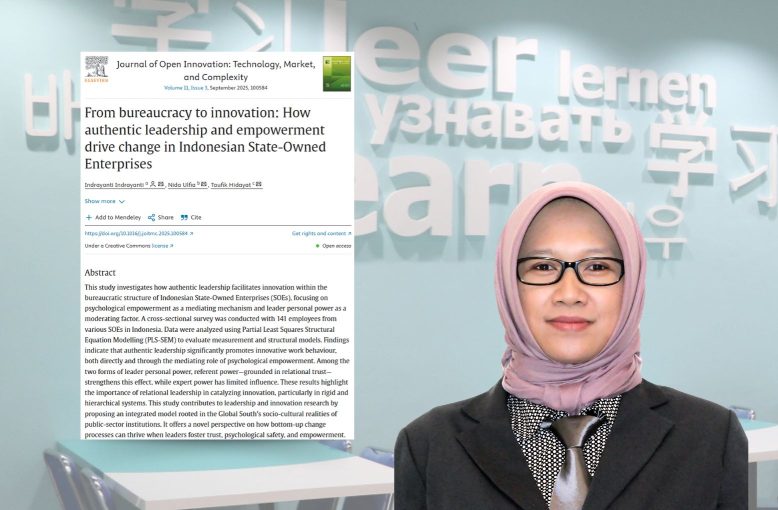
Yogyakarta, 2 Juli 2025 — Budaya birokratis yang kaku kerap menjadi tantangan dalam mendorong inovasi di Badan Usaha Milik Negara (BUMN). Sebuah riset terbaru dari tim akademisi Universitas Gadjah Mada mengungkap bahwa authentic leadership dan psychological empowerment menjadi motor penting dalam mendorong inovasi di tubuh BUMN Indonesia.
Dipublikasikan di jurnal internasional bereputasi tinggi, Journal of Open Innovation: Technology, Market, and Complexity (Scopus Q1, CiteScore 14.0), studi ini ditulis oleh Indrayanti, Nida Ulfia, dan Taufik Hidayat. Artikel berjudul “From Bureaucracy to Innovation: How Authentic Leadership and Empowerment Drive Change in Indonesian State-Owned Enterprises” ini menyoroti bahwa inovasi bukan hanya soal struktur, tetapi tentang kepemimpinan yang tulus dan karyawan yang merasa berdaya.
Riset melibatkan 157 pegawai dari berbagai sektor BUMN dan menggunakan analisis statistik PLS-SEM. Hasilnya menunjukkan:
– Kepemimpinan otentik secara signifikan memperkuat budaya organisasi.
– Budaya organisasi yang sehat memediasi lahirnya perilaku kerja inovatif.
– Pemberdayaan psikologis memperkuat kepercayaan diri, makna kerja, dan inisiatif pegawai.
Dengan pendekatan yang humanistik dan strategis, temuan ini mempertegas bahwa transformasi sektor publik perlu dimulai dari dalam — lewat pemimpin yang otentik dan lingkungan kerja yang memberdayakan. Relevansi studi ini pun mengarah langsung pada pencapaian SDG 8, 9, dan 16, khususnya dalam membangun institusi yang tangguh dan inovatif.
Abstract. This study investigates how authentic leadership facilitates innovation within the bureaucratic structure of Indonesian State-Owned Enterprises (SOEs), focusing on psychological empowerment as a mediating mechanism and leader personal power as a moderating factor. A cross-sectional survey was conducted with 141 employees from various SOEs in Indonesia. Data were analyzed using Partial Least Squares Structural Equation Modelling (PLS-SEM) to evaluate measurement and structural models. Findings indicate that authentic leadership significantly promotes innovative work behaviour, both directly and through the mediating role of psychological empowerment. Among the two forms of leader personal power, referent power—grounded in relational trust—strengthens this effect, while expert power has limited influence. These results highlight the importance of relational leadership in catalyzing innovation, particularly in rigid and hierarchical systems. This study contributes to leadership and innovation research by proposing an integrated model rooted in the Global South’s socio-cultural realities of public-sector institutions. It offers a novel perspective on how bottom-up change processes can thrive when leaders foster trust, psychological safety, and empowerment. The findings suggest that SOEs aiming for sustainability and agility should incorporate empowerment-based leadership into reform strategies. Leadership development should focus on technical competence and relational credibility. Future research is encouraged to employ longitudinal or mixed-method approaches to capture the evolving dynamics of leadership and innovation over time and across diverse organizational contexts.
Keywords: Authentic leadership; Psychological empowerment; Personal power; Innovative work behaviour; State-owned enterprises; Public-sector transformation; Indonesia
Artikel ini tersedia secara daring melalui tautan: https://www.sciencedirect.com/science/article/pii/S2199853125001192
Berdasarkan kata kuncinya, artikel ini adalah luaran penelitian yang fokus pada SDG: 8, 9 & 16.
Selamat untuk mbak Indrayanti dan tim penulis.
Penulis & Editor: Tim UP & Humas
